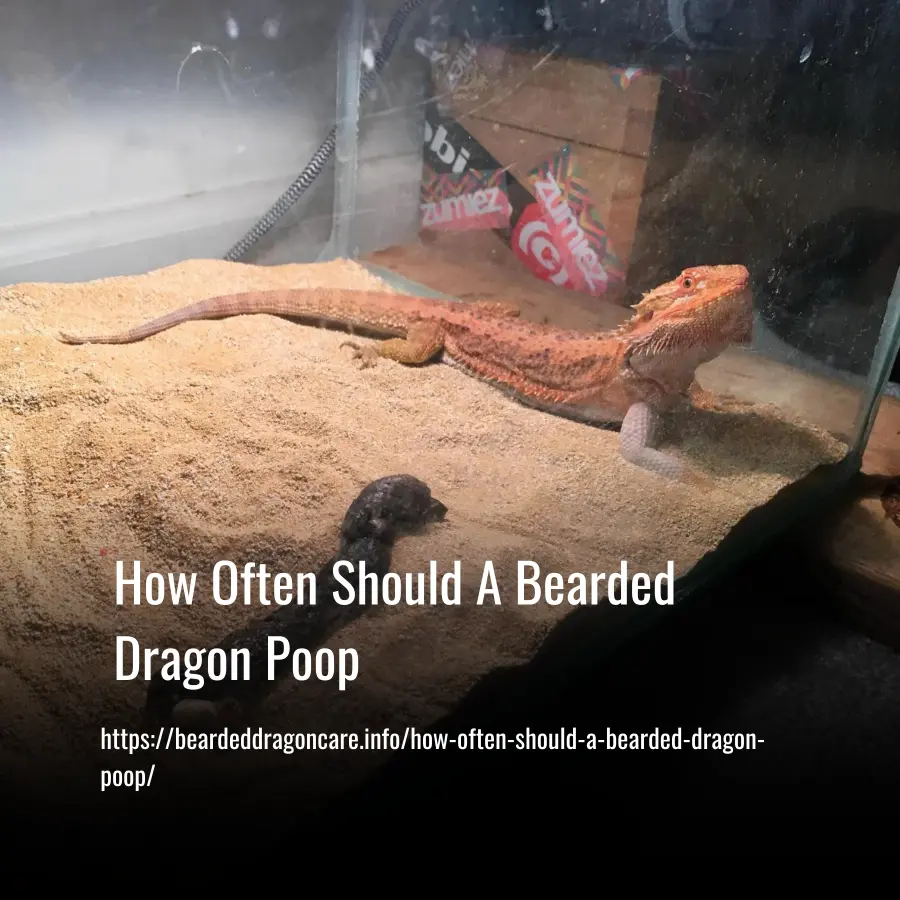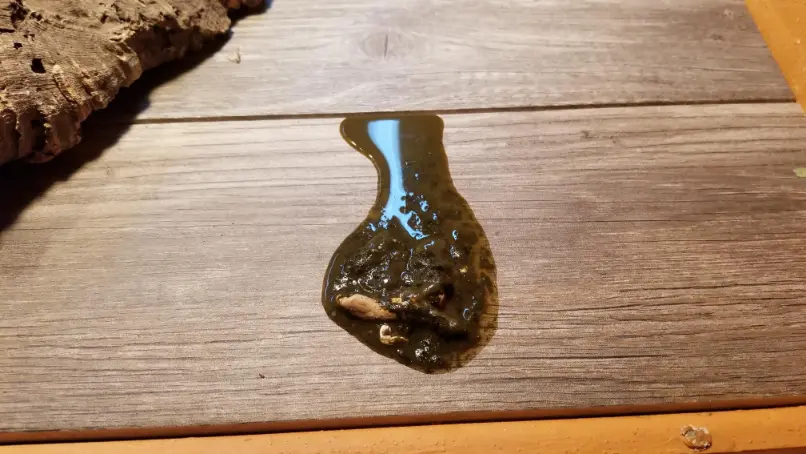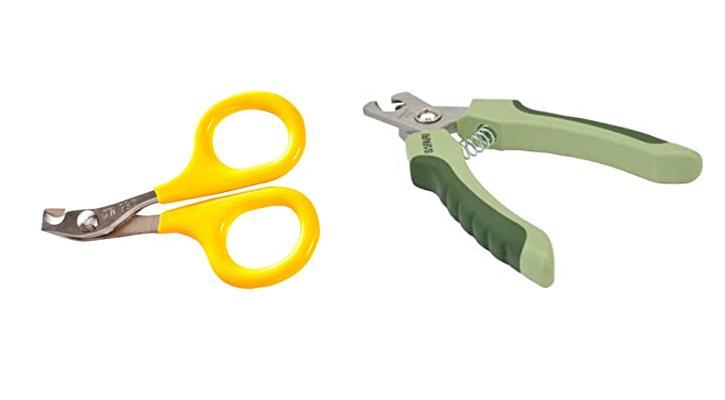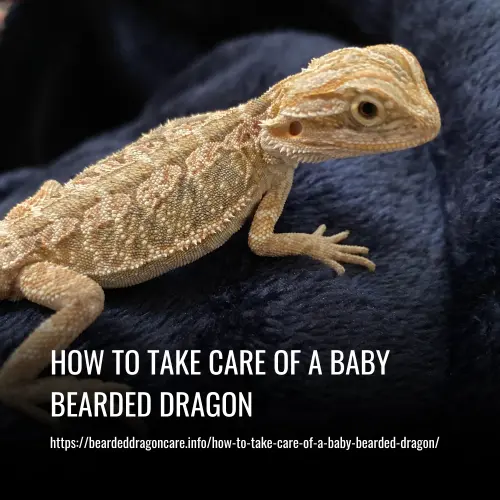Do you have a pet bearded dragon? Are you embarrassed by their smelly waste? Is it hard to keep your home smelling fresh?
Bearded dragons aren’t the cleanest of creatures and it can be downright uncomfortable when they poop inside your home or tank. You need to know how often to expect poops from your scaly friend!
If you’re wondering about how often should a bearded dragon poop, you’ve come to the right place. In this article, we’ll look at what normal body functions are for bearded dragons, why they poop when they do, and how often to expect them to defecate.

Healthy Bearded Dragon Poop
If you’re a bearded dragon owner, it’s important to pay attention to the look and consistency of your pet’s poop. Healthy bearded dragon poop should be semi-solid and log-shaped with the white part having a pasty consistency. The color should be mostly brown with a section of white or slightly yellow hidden somewhere in the mix.
Adult bearded dragons will usually go once a week when they have healthy systems, whereas babies and juveniles may go more frequently; around once per day. So if you notice any abnormalities in your pet’s pooping habits, make sure to get them checked by a vet!
How Often Do Bearded Dragons Poop And Pee
Bearded dragons experience a different type of urination than what we are used to. Rather than normal urine excretions, they produce uric acid as a byproduct of their kidneys. As such, the frequency at which they poop and pee can vary depending on age, health, and other factors.
On average, hatchlings and juveniles will poop and pee more than adults as they tend to eat more food. A healthy adult bearded dragon should ideally be pooping once a day and peeing several times a day if all is well with them.
However, any signs that their pooping and peeing habits have suddenly changed could indicate something wrong and it would be wise to consult with your veterinarian for an appropriate diagnosis.
It is worth noting that a nice environment is conducive to pooping and peeing habits as Bearded Dragons are quite sensitive to loud noises. A diet too plays a key role in ensuring optimal elimination from a bearded dragon’s body; especially greens and other items that provide well-balanced nutrition.
Last but not least, there may be a few parasites present in feces from time to time which can cause stress on bearded dragons leading to loose stools or dehydration if left unattended.
How Long Can A Bearded Dragon Go Without Pooping
The general answer to the question of how long can a bearded dragon go without pooping is two days at most. If left alone for any longer, this could be an indication of a health problem and your dragon may become ill or injured.
That being said, it’s important to keep in mind that if your dragon hasn’t been in brumation for more than a week, you shouldn’t let it go too much longer than two days without pooping.
Bearded dragons are solitary creatures and can live up to 25 years if they are given proper care. To avoid boredom while you’re away from them, make sure to give them enough fresh vegetables and water. This way, your Beardie will stay active and inquisitive until you return!
How Long After Eating Do Bearded Dragons Poop?
Bearded dragons have different digestion rates, but typically, they finish digesting their food within a couple of hours. It’s important to keep an eye on your dragon’s poops to make sure that everything is going smoothly. If you detect any changes in the frequency or consistency of their poop, it could be a sign of an underlying health issue and it’s best to take them to get checked out by a vet.
You can consider factors like the temperature and humidity in their environment as well as the vitamin D from UVB light which are all essential for keeping them healthy. Also, watch out for parasites that can interfere with their digestion or iron deficiency caused by a lack of calcium and vitamin D in their diet.
The key is to provide them with a healthy diet full of insects –Dubia roaches are recommended- and split into three feedings throughout the day so that your dragon has enough time to digest everything properly and poop accordingly. By doing this, you will be giving your bearded dragon the best chance of good health in years to come!
Unhealthy Bearded Dragon Poop
Unhealthy Bearded Dragon poop is red flag that shouldn’t be ignored. It can come in different colors, consistencies, and shades, all of which are an indication that something isn’t quite right with your pet.
For example, if the poop is liquid or very soft, this could be a sign of parasites or dehydration. If the stool is black or bloody then this could indicate an infection or digestive problems. Additionally, if the feces are darker than usual or have a strange smell, this could be cause for concern as well.
Visiting your vet is always recommended if you suspect something is wrong with your Bearded Dragon’s stool, but there are also things you can do at home to help out your dragon such as providing it with access to sufficient food and water and ensuring its habitat is kept clean and free from stressors.
What Does Runny Poop Indicate?
Runny poop in your bearded dragon could be a sign of several possible issues. Dehydration is one major concern since bearded dragons don’t typically drink much water and runny poops can quickly cause this. Additionally, parasites, dietary changes, or high-fiber diets can lead to runny stools.
If the stools have any signs such as foul smell, mucus, pus,, or blood strands along with lethargy, loss of appetite, or weight loss then it could be a sign of parasites – something which should be taken care of by making a visit to the vet immediately. If there aren’t any behavioral changes but still the poops are runny then it’s likely due to diet (i.e., a high-fiber diet) which should be reduced. However, if this doesn’t work then again you should make an appointment with your vet.
Lastly, it is important for owners to watch out for dehydration symptoms due to the decrease in liquid intake from the diet caused by runny poops. Keeping an eye on your dragon will help keep them safe and healthy!

Constipation
When it comes to the health of your bearded dragon, it’s important to keep an eye out for any signs that may indicate something is wrong. One of the most common issues is constipation – if your pet hasn’t pooped in a few weeks and appears uncomfortable, then he could be constipated.
Constipation isn’t the only issue that could cause your dragon discomfort. He may also have an impaction or some other underlying medical issue that needs to be addressed. It’s important to keep a regular bowel movement schedule for your bearded dragon – about once a week is ideal. If you notice anything out of the ordinary, then make sure to take him in for a checkup with a vet who specializes in reptile care so they can diagnose the underlying cause and recommend treatment options.
Stress
Stress is a very real issue for many animals, especially for those in captivity, like our beloved Bearded Dragons. If you notice your dragon showing signs of distress like a black beard or excessive jitteriness, biting, and constipation – these could all be indicators that your pet is feeling stressed out.
Before assuming something like this, take time to think about what may have changed in the environment of the enclosure. Loud noises or changes to the regular routine can easily cause stress in our scaly friends.
If you do find yourself in a situation like this, it’s important to take steps to reduce stress on your beardie as soon as possible so that she can get back to her normal routines quickly.
Impaction
Impaction is a condition that can occur in beardies, where waste gets stuck in the bowels and won’t pass. It is usually indicated by your dragon straining with no results, disinterest in food, difficulties with movement, abdominal lumps when gentling rubbing their belly, and even bloated stomachs.
The best way to deal with mild constipation or impaction is to give them a warm bath and massage their bellies towards the vent for a few minutes at a time. If this does not work you can try offering some homemade laxatives like applesauce and pumpkin puree with added water or giving them a few drops of olive oil directly from a dropper.
However, if none of these remedies help, then it would be wise to contact your vet as they can administer more aggressive medication and provide alternative solutions to bring your beloved beardie back to health.
Different Colors of Poop and What to be Concerned About
Bearded dragons, just like us humans, come in a variety of colors. The same goes for their poop! Different colors of bearded dragon poop can indicate different underlying issues that you need to be aware of and pay attention to.
The most common colors of beardie poo are green, yellow, black, red, and white. Each color can signify something different – for example greens could mean your beardie is consuming too many leafy greens, while yellows may indicate parasites or dehydration.
It’s important to keep an eye on any changes in color with your dragon’s poo to make sure they remain healthy and happy! If there are any drastic changes or if you just want peace of mind make sure you consult a veterinary professional as soon as possible.
Have you ever seen green bearded dragon poop?
Green-tinted bearded dragon poop is a common occurrence that pet owners may come across from time to time. In most cases, it is nothing to worry about as the dark leafy greens that you feed your dragon can give their droppings an emerald tinge.
However, if you find the occasional poo to be particularly green and smelly, like a garbage dump, then this could indicate a more serious issue such as liver problems or certain diseases. Therefore, it’s important to take your furry friend to the vet if you observe these signs in order to seek medical assistance and get further advice on potential solutions.
What does yellow bearded dragon poop indicate?
Yellow bearded dragon poop can often indicate that the reptile is consuming too much calcium. Calcium is an important mineral for their diet, but when given in excessive amounts it can cause yellow poops.
Adult bearded dragons should get their calcium from dark leafy greens and vegetables as the main source of their intake. A calcium supplement should be given just once a week to ensure that pets are receiving all the essential minerals they need from a balanced diet. If yellow poops appear, then you may have to reduce their calcium intake a little until things go back to normal.
What to do When You See Black Bearded Dragon Poop
When you spot black-bearded dragon poop, it’s time to take action! The most likely cause for black dragon poops is a diet too heavily laden with insects. Young dragons need the protein from these insects to help them grow, so their diet should consist of mostly insects and only some veggies. For adults, it should be the other way around: 70% veggies, greens, and fruits and only the remaining 30% in insect matter.
However, if you’ve given your dragon proper nutrition yet still find black poops, your best bet is to take a stool sample to the vet for further testing. It might be that they have parasites or some other issue going on, and this will help rule out other possible causes before taking further action.
But if all else fails and you’re still seeing black poops even after getting vegetables into their diet properly, then it never hurts to give your beardie a warm bath to see if that helps remedy the impaction. You can even try giving them fruity snacks like applesauce or watermelon as part of their diet – these are both rich in hydration so they may just chug through the issue!
Finally, if you find yourself dealing with not just solid but watery black poop then chances are there could be something deeper going on such as parasites – in this situation book an appointment with your vet straight away!
How to Treat Red Bearded Dragon Poop
If your bearded dragon’s poop is unusually red in color, it could mean different things. In most cases, the red tinge is the result of its diet having too much store-bought food with red dye or items like raspberries and strawberries. If this is the case, it should clear up on its own in a day or two; no intervention is required.
However, red poop can sometimes indicate the presence of blood or a serious internal issue such as an impaction, parasites, or internal bleeding. If you see signs of blood in their stool or evidence of bleeding coming from their vent or cloaca, then make sure to seek veterinary advice immediately as there might be something more serious at play.
Also, take them to a vet if you feel hard nubs underneath their belly along with bloody stools.
It’s always better to be safe than sorry when it comes to your beloved pet dragon’s health – so don’t hesitate to consult your vet if you have any concerns about red-colored poop!
What is the white stuff?
If you’ve ever looked at the droppings of a Bearded Dragon, you may have noticed that there is always something white and chalky in it. This white substance is known as urate, and it’s the way that bearded dragons expel and conserve water. Urate also helps to eliminate uric acid from their system.
Urate should appear as a paste-like consistency and should not have any sort of odor to it. It should always be accompanied by the normal, brown droppings of your dragon. If you don’t see any evidence of this white substance present in your dragon’s poop, then you should take them to see a veterinarian as soon as possible.
Why is My Bearded Dragon’s, Poop White?
If you notice that your bearded dragon’s poop is mostly white, it could mean she is dehydrated. To check for dehydration, you can gently tug at the skin to see if it slowly goes back or looks wrinkled.
White and chalky-looking poop may indicate a lack of fluids in the diet. Make sure there is always a shallow water dish available with clean water and encourage your beardie to drink by offering juicy foods like mango, papaya, or watermelon. You can also offer occasional fat, juicy hornworms as a liquid-packed treat!
If your bearded dragon’s poop is consistently white, it’s important to take action right away and more fluids into their diet. Rehydrating them will ensure they are healthy and content—and make sure those little poops are no longer white!
Maybe it’s not Poop at all…
If you have ever owned a bearded dragon, then you may have noticed them occasionally leaving behind a solid yellow object. At first, it might look like poop, but don’t let that fool you! It could actually be an unfertilized egg.
Yes, even when female bearded dragons are alone they can sometimes lay eggs. This doesn’t mean that something is wrong, as sometimes these eggs are more of a “practice run” and lessens the chance of the female laying a real clutch later on.
When my female beardie did this, she passed 13 unfertilized eggs in one night! When I got worried and my vet said it was just a practice run and nothing to worry about, I decided to move the male into his own enclosure just in case she did indeed want to lay fertilized eggs one day.
Other Ways to Hydrate a Bearded Dragon
Besides giving your bearded dragon a bath, there are other ways you can help them stay hydrated. For starters, spraying the dragon’s enclosure with mist or water can help to hydrate its skin and it may even lick off some of the moisture beads on its body.
If you give them store-bought food that needs to be rehydrated, don’t drain the water off from the dish – this extra water can give your dragon a little extra hydration as it eats. If you feed fresh vegetables and fruits, mist some clean water onto them so your beardie can get even more hydration that way.
These methods, along with bathing and even adding liquid vitamins to their food, can all help ensure your bearded dragon stays well-hydrated and healthy!
Conclusion:
Bearded dragons are incredibly fascinating and enjoyable pets, but they also have specific needs that must be kept in mind. It is important to pay attention to their diet and make sure they are pooping regularly so that their health can remain in optimal condition.
With the right diet and plenty of fresh water, your bearded dragon should have regular bowel movements every day or two, though this can vary slightly depending on individual circumstances.



